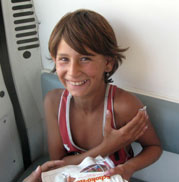 The stark warning comes as senior decision-makers gather in Turkey (16-19 September) to review progress on a promise made in 2010 to rid Europe of both diseases by 2015.
The stark warning comes as senior decision-makers gather in Turkey (16-19 September) to review progress on a promise made in 2010 to rid Europe of both diseases by 2015.
“The measles and rubella elimination target of 2015 is under threat….Business as usual may not be sufficient to reach the elimination target,” according to a briefing paper circulated in advance of the meeting. It calls for “accelerated action and innovative ways of reaching susceptible populations”.
The WHO has also published a new as concerns grow that outbreaks of both diseases threaten to derail elimination efforts.
Measles and rubella are in the crosshairs because both can kill or cause serious harm, yet both are eminently preventable if national immunisation guidelines are followed.
When the elimination pledge was made three years ago, there was a sense that Europe was on the cusp of defeating these diseases. However, since 2010, there have been over 100,000 cases of measles. Over 40% of cases were reported in people over 15 years of age.
Measles can cause serious complications and, since 2010, eight countries have reported a total of 34 measles-related deaths.
More than 95% of the population should have two doses of measles vaccine if it is to be wiped out, according to experts. This has proven particularly challenging in some subgroups of the population such as adolescents and the Roma community.
For example, young people have been seriously affected by recent measles outbreaks in the UK and rubella epidemic in Poland, prompting the rollout of catch-up campaigns in some – but not all – European countries where vaccine coverage rates are low in teenagers and young adults.
The campaign to eliminate rubella has seen some success but there have been setbacks too. The main goal is to end congenital rubella syndrome (CRS) which can occur in new-born babies whose mothers are infected during pregnancy.
The condition affects the normal development of several of the baby’s organs. CRS can result in a range of serious health problems ranging from deafness and cataracts to heart problems and mental retardation.
Last year there was a three-fold increase in reported cases of rubella, accounted for to a large extent by outbreaks in Romania and Poland.
The 20,000 rubella cases recorded in Romania in 2011-2013 resulted in 22 cases of CRS, 9 of which were fatal.
In Turkey this week, officials from the WHO’s Regional Office in Europe will seek a renewed political commitment to deliver the goal. They want to see measures to tackle complacency among the public and doctors, along with concrete efforts to increase demand for vaccination and educate health professionals.
A verification process has been established to monitor progress and new tools have been provided to national health authorities to help them to to high-risk groups.
Nearly one million children born in the European region are not vaccinated according to their national immunisation schedules. The message from the WHO is that unless radical measures are taken to address this then measles and rubella are here to stay:
“Greater efforts are required if Member States are to honour their commitment to eliminate measles and rubella. Without the necessary accelerated action, backed by political commitment and adequate resources, these avoidable diseases will continue to infect thousands of susceptible individuals each year.”




